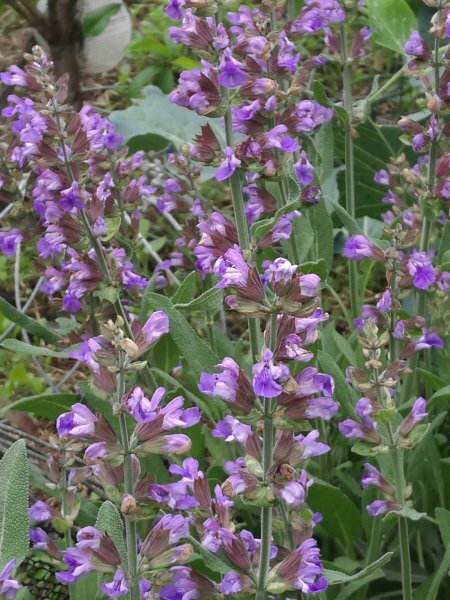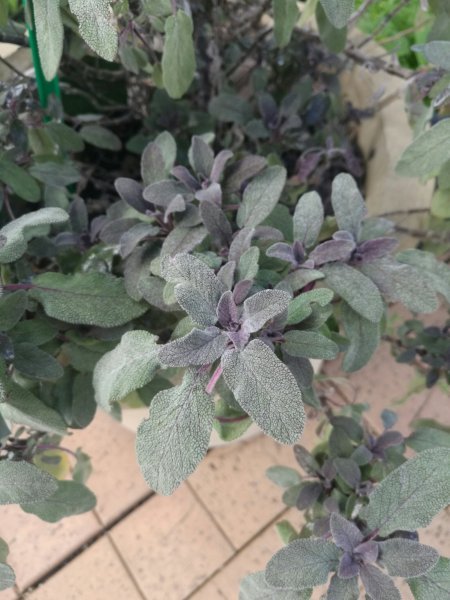Garden Herbs - Sage
Hi Herbal Hiveans. Here's the next in my new series of posts covering how to use the herbs in our garden. You can find the earlier ones by wandering back through my blog. Once I've quite a few, I'll make an index page for them for your ease of use. This installment is about Sage.

Common names: Sage, Garden Sage, Common Sage
Taxonomic name: Salvia officinalis
Family: Lamiaceae
Uses: Food, stomach problems, liver problems, fluid problems, infected cut and sores
Area of origin: Mediterranean
Warnings: None
Sage (Salvia officinalis) is another of those favorite kitchen herbs that has uses beyond being a tasty additive to meals.
Sage is well known as an antibacterial and is used as a tea and a gargle for sore throats, gum conditions, bad breath…anything that can relate to bacteria in the mouth and throat. It can also be used externally as a wash for skin infections, cuts, and sores.
Now, if you read some superficial texts and articles, you will see that Sage is good for increasing sweat, in others you will see it as being used to decrease sweating. Some will have it as good for increasing mucus production, others for decreasing it.
Confusing, right? This is the fault with the usually sensationalist approach of articles and books that are interested in just grabbing your attention. Even some older books don’t reconcile these points. However, trust yours truly and we’ll try to make sense of it all so that we can use Sage far more effectively.

If you’ve been with us for a while, you may have seen that other herbs have a deeper effect on our bodies and minds that can go some way to explaining inconsistencies. One thing that is clear from a lot of research is that it is the manner in which we use Sage has an effect.
Sage is similar to many other herbs that effect fluids in the body. They promote sweating when taken as a hot tea, decrease it when taken cold. Some will act to make us sweat when taken hot and make us urinate when cold. I won’t go deeply into these effects here. Maybe a full post on them later.
Let’s deal with our digestion before we deal with our minds. Sage has bitter properties and oils. In other posts, I’ve covered how bitters have an amazing range of actions on our bodies, but here we’ll stick with the traditional one. Through it’s bitter action, Sage stimulates the gallbladder to produce and excrete bile. Bile is the stuff that helps break down fats and oils and also stimulate the intestines to get to work and move food stuffs on through and out.
So, we can see how Sage is used for a lot of stomach, liver and gall bladder symptoms such as nausea, biliousness, constipation and the like. That one of the many reasons it’s used on so many meals. Use it and you’re helping your whole digestive tract digest, assimilate and pass food.
Like all of my favorite herbs, Sage has even deeper effects. Sage works on the hypothalamus, you can’t really get much deeper than this. For those who have forgotten their high school biology, this gland pretty well controls all the other glands.
‘Wow! A herb in my kitchen does this’? Yep.
The hypothalamus reads the blood content and adjusts our hormones to make changes that are needed. Several key areas that this gland works on are; body temperature regulation, fluid levels and sex hormones. Sage can then influence these. That’s a big claim, I know, but some of the other uses of Sage will help us understand.
Sage is a normalizer for fluids. Blood, lymph, sweat, milk, urine, all can be balanced using Sage. Think of Sage when you see dry, withered skin, especially during menopause. That is the distinguishing feature of an illness that needs Sage as a remedy.
We mentioned that Sage is good for bile production, and therefore fat and oil digestion. The products of this digestion are called lipids and they influence key hormones like steroids and sex hormones. Better production of lipids means that these hormones are carried and distributed better. These hormones affect the skin and it’s fluid and oil levels.
Can you see where this is heading? Remember that earlier I wrote that Sage can increase or decrease sweating. This is how it does it! Through improving the production and transportation of the hormones needed to do the job. Sage has complex effects.
Making a tea from this herb
To make tea, simply place a teaspoonful or two of dried or fresh herb into a cup of hot water. Cover the cup while the brew steeps so that you don't lose any of those precious oils.







I find it helps shorten the length of my migraines, if I drink half a pot of it as a tea. I'm not entirely sure if it's because I'm increasing my fluid intake at the same time, though. Izzy likes sage tea for her headaches too, though, so stress relief?
Good to hear that someone's using it! Sage, Rosemary and Lavender all change the blood circulation in your brain so that accounts for their effectiveness with migraines and headaches,
Ahh, so that's why lavender and Rosemary too. I've used Rosemary more as an adaptogen for the same reasons, but not sure on the effectiveness there. It was a nice flavour difference added to my water bottle, though.
I just bought some seeds and I can't be more happier to collide with this biology lesson on the something that I intend to plant and be using 🌱
Glad to be of help.
!hivebits
Gosh I am loving this series of yours, even if it takes a while to comment! Busy.
I love sage - I never really thought about it as useful until I started diving deep into it. For me, it's for sore throats - an ACV/sage tincture is always on hand. But also for colds.
And yes, as a regulator. Hitting menopause meant that I started taking sage all the time, but it had no effect on my night sweats. Perhaps I had to take it for longer. Really fascinating post, @ligayagardener. Have you studied herbalism formally?
For the menopause, its hard to find a herb that acts quickly. It's a natural, though uncomfortable process, so nothing is technically 'wrong' with you that needs curing.
I have studied some aspects of natural medicine but got bored with schooling and struck out on my own
Yeah I hear you!! Plus it's exoensive. I like to learn about plants more the old school way, reading, listening, experimenting, discovering..
I've a really short attention span as I get older😂